Charles E W Bean, Diaries, AWM38 3DRL 606/60/1 - September - October 1916 - Part 2
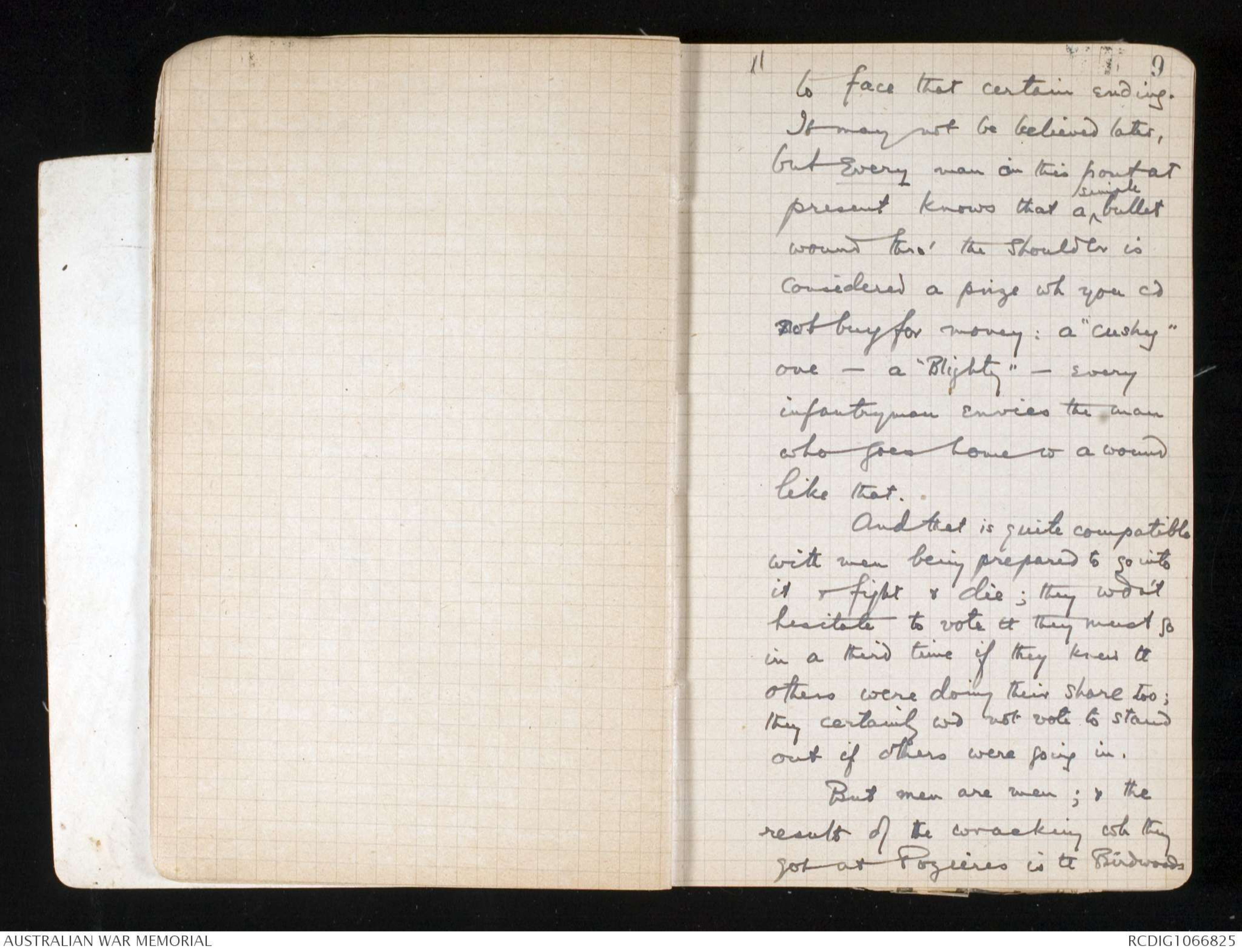
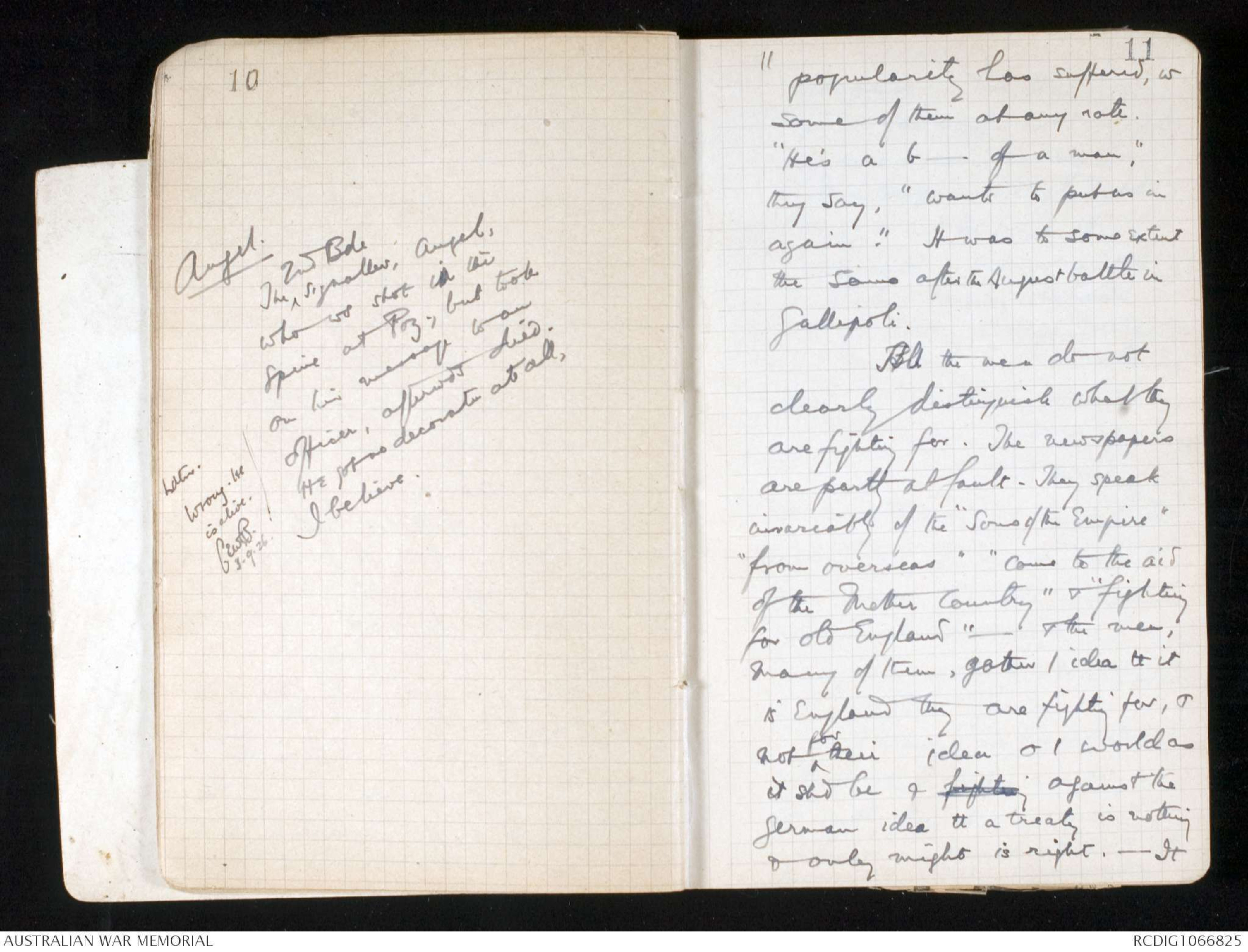
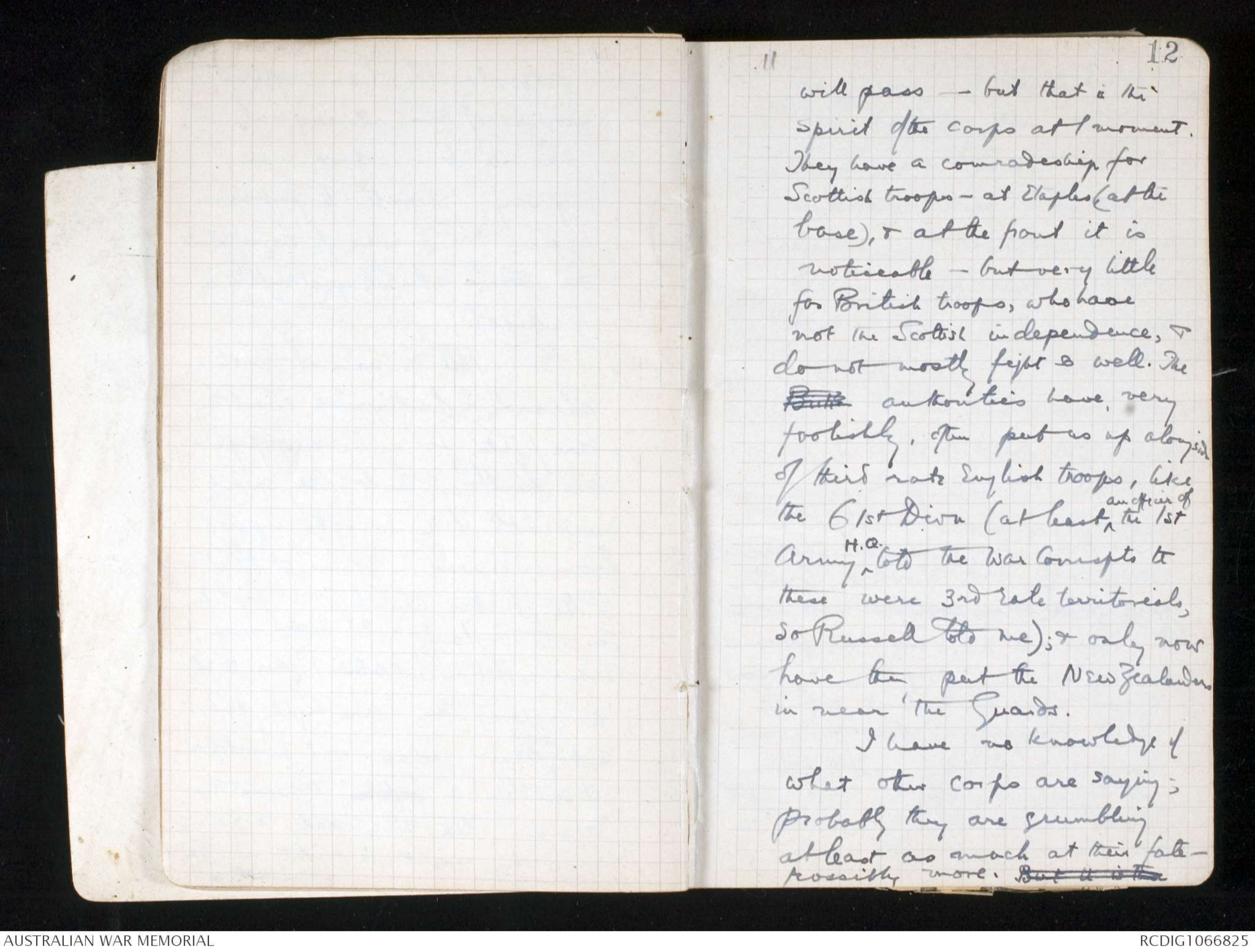
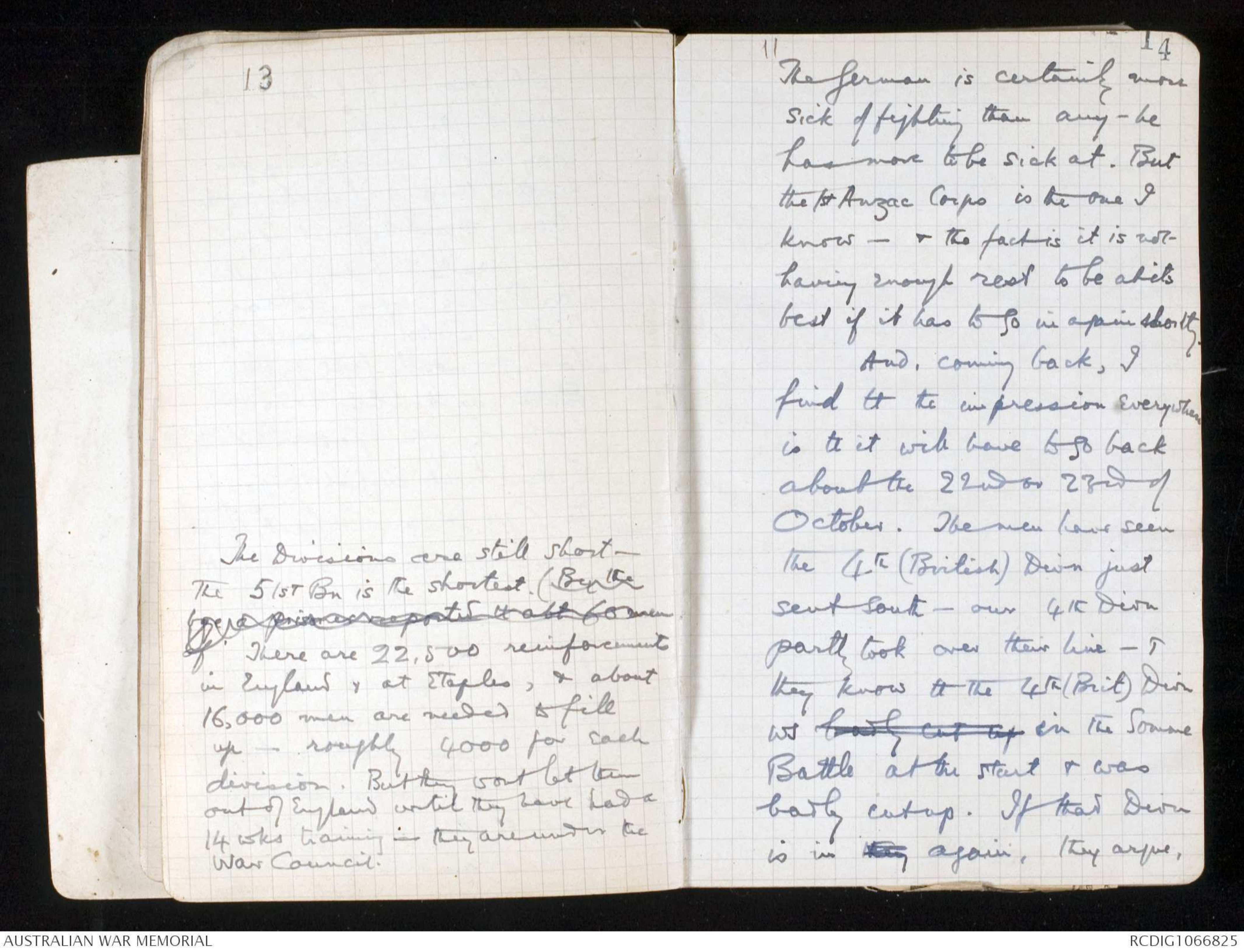
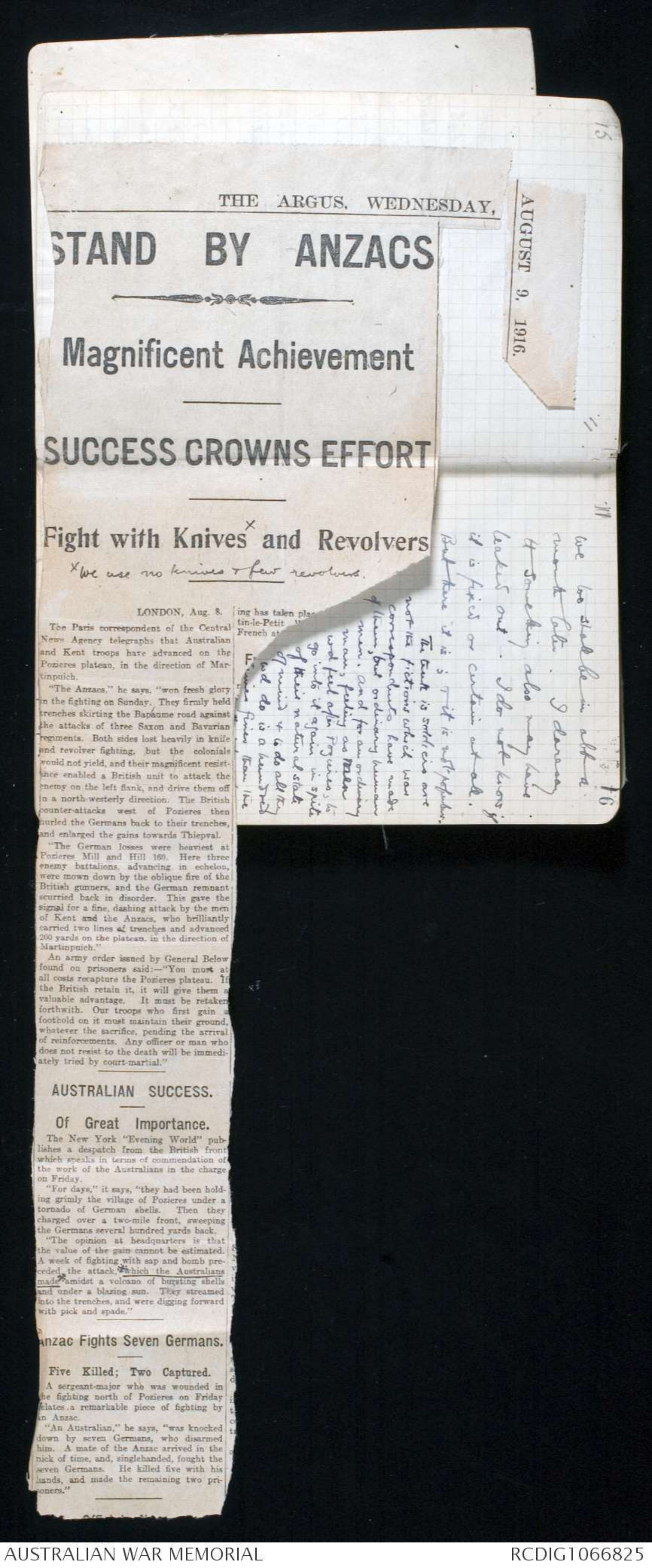
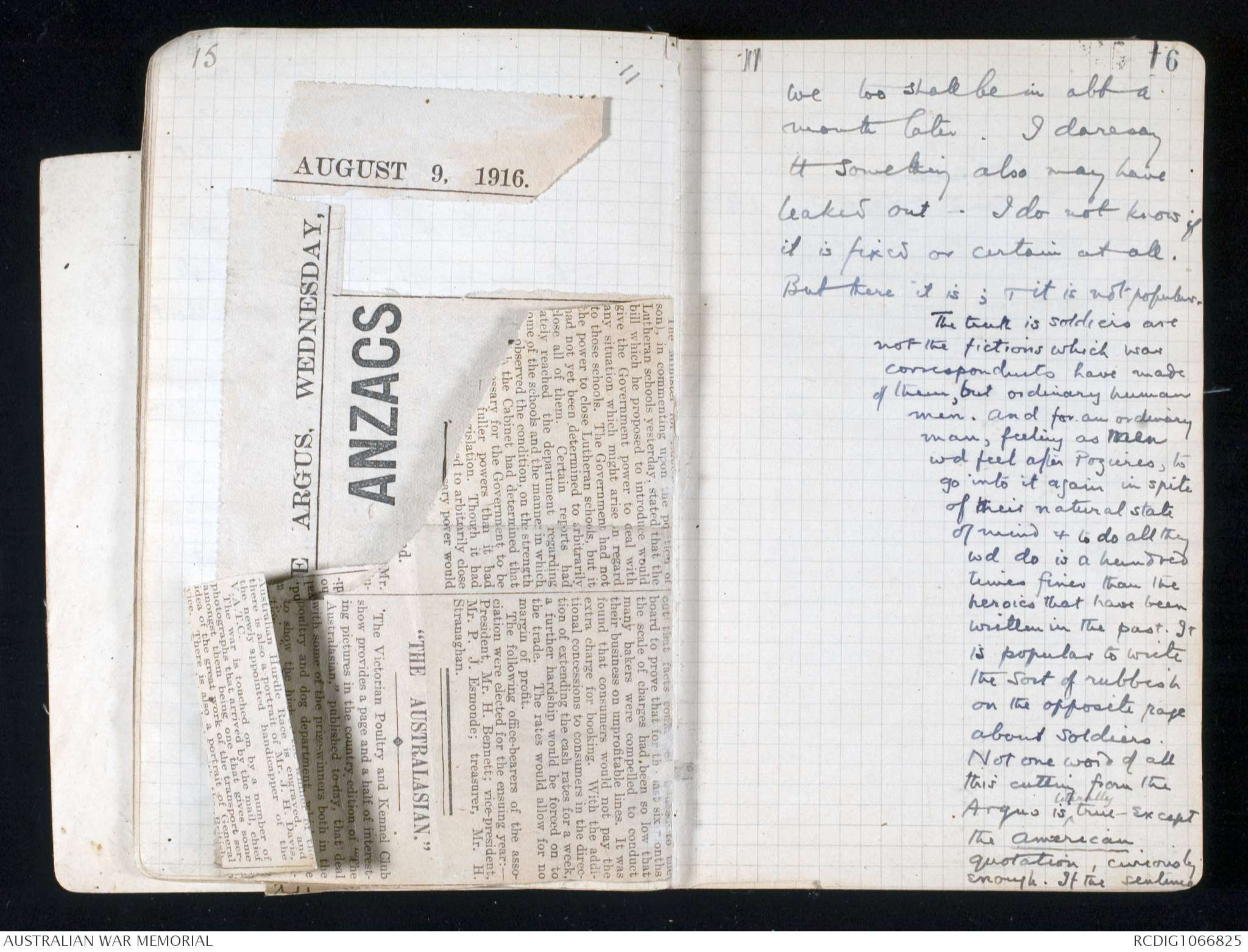
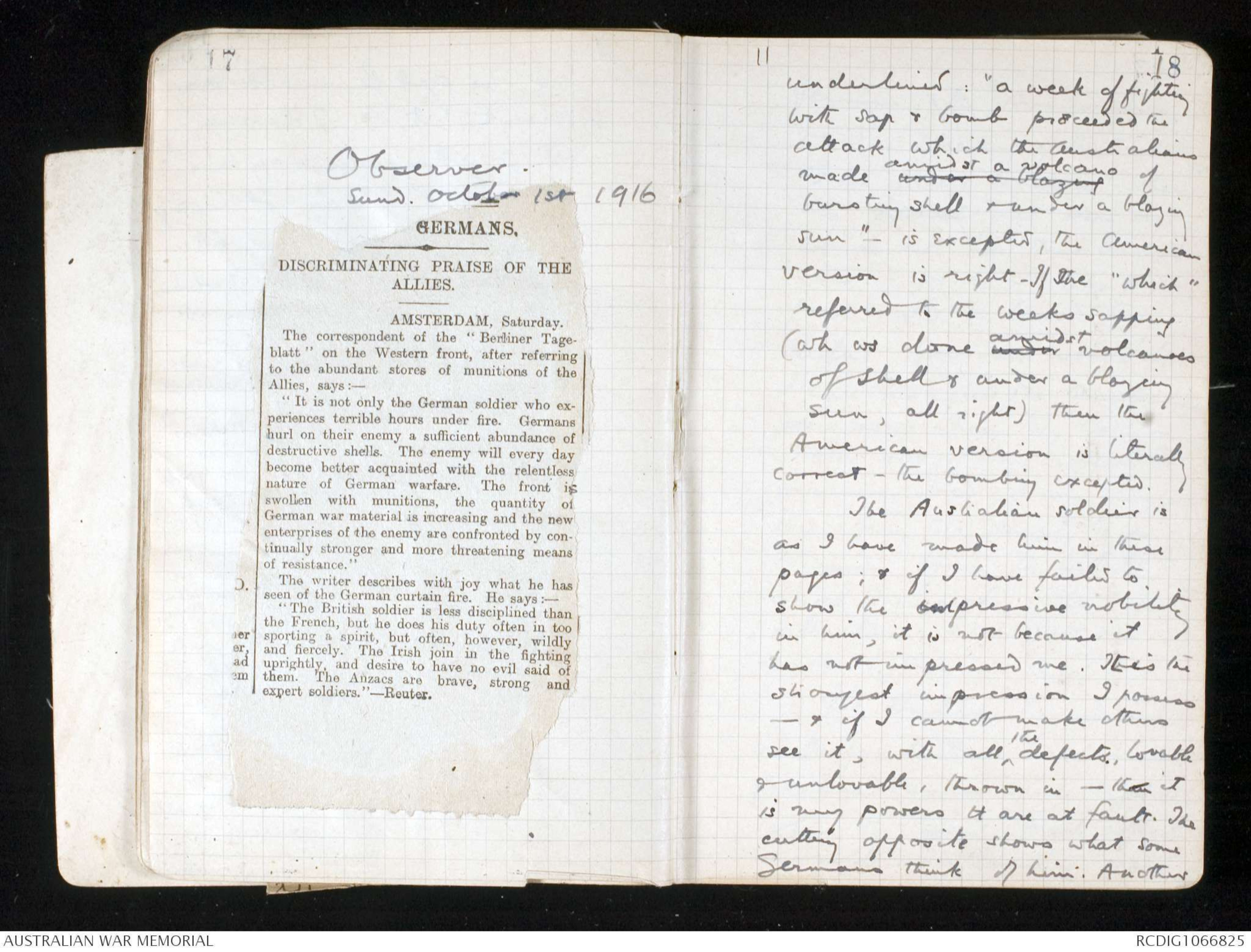
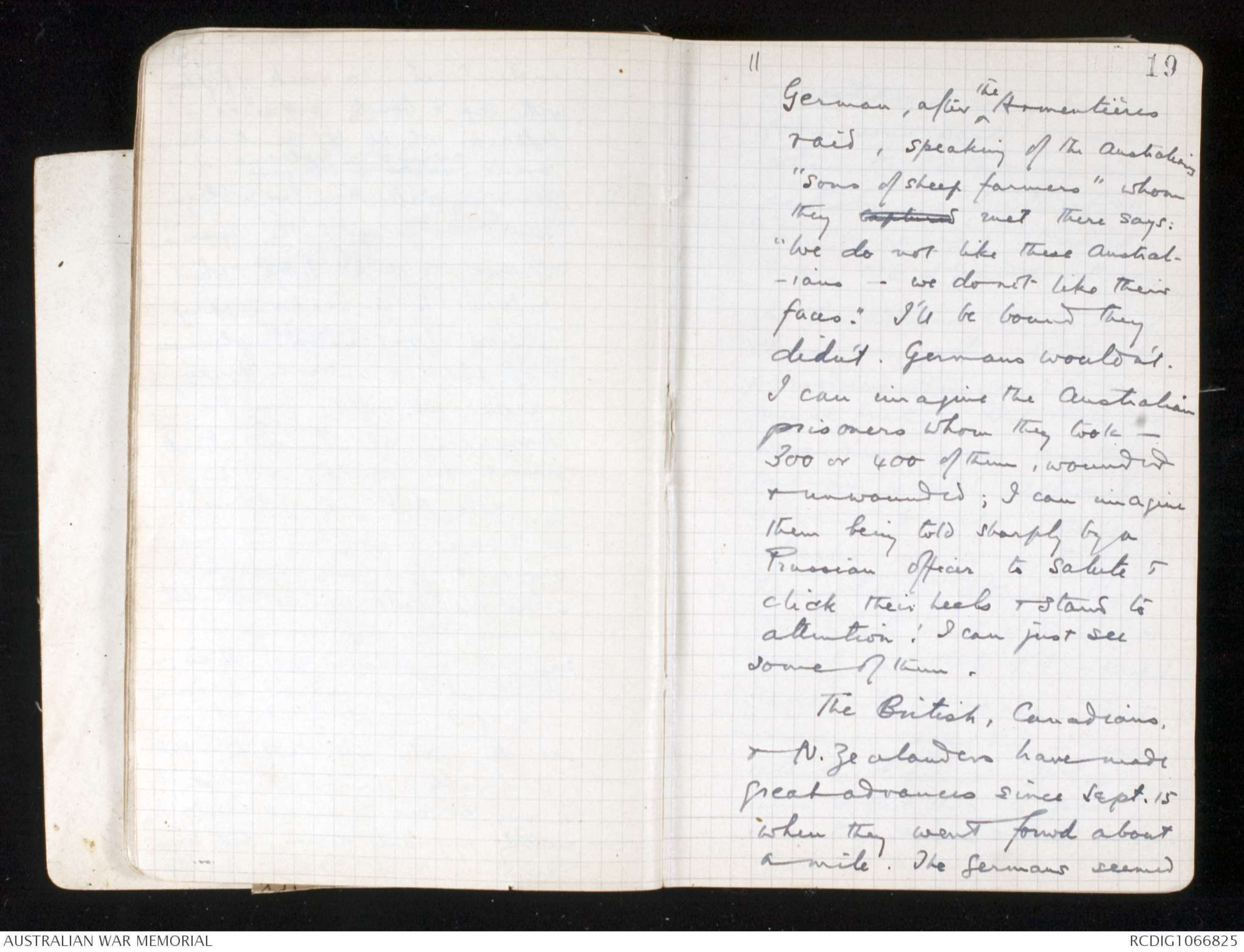
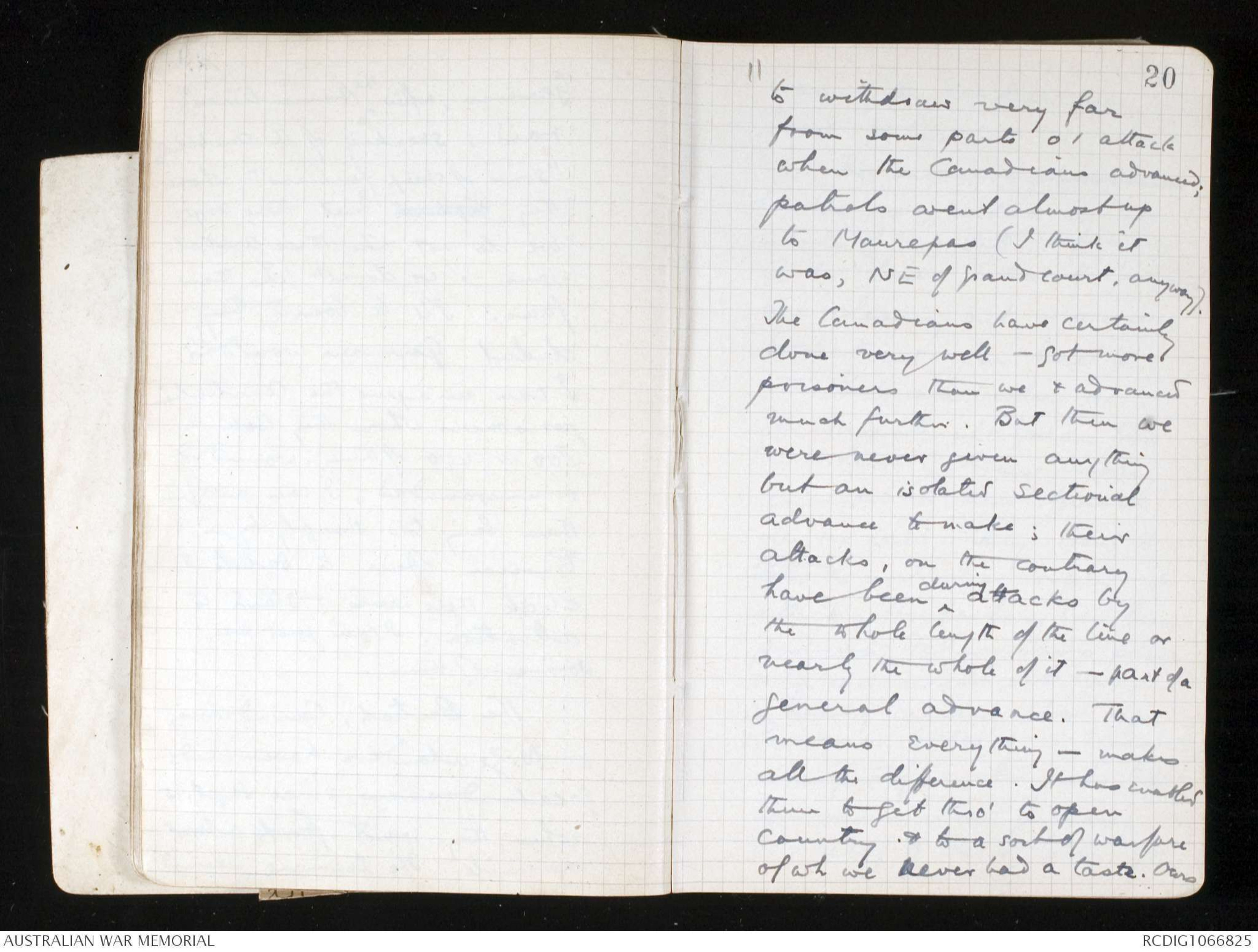
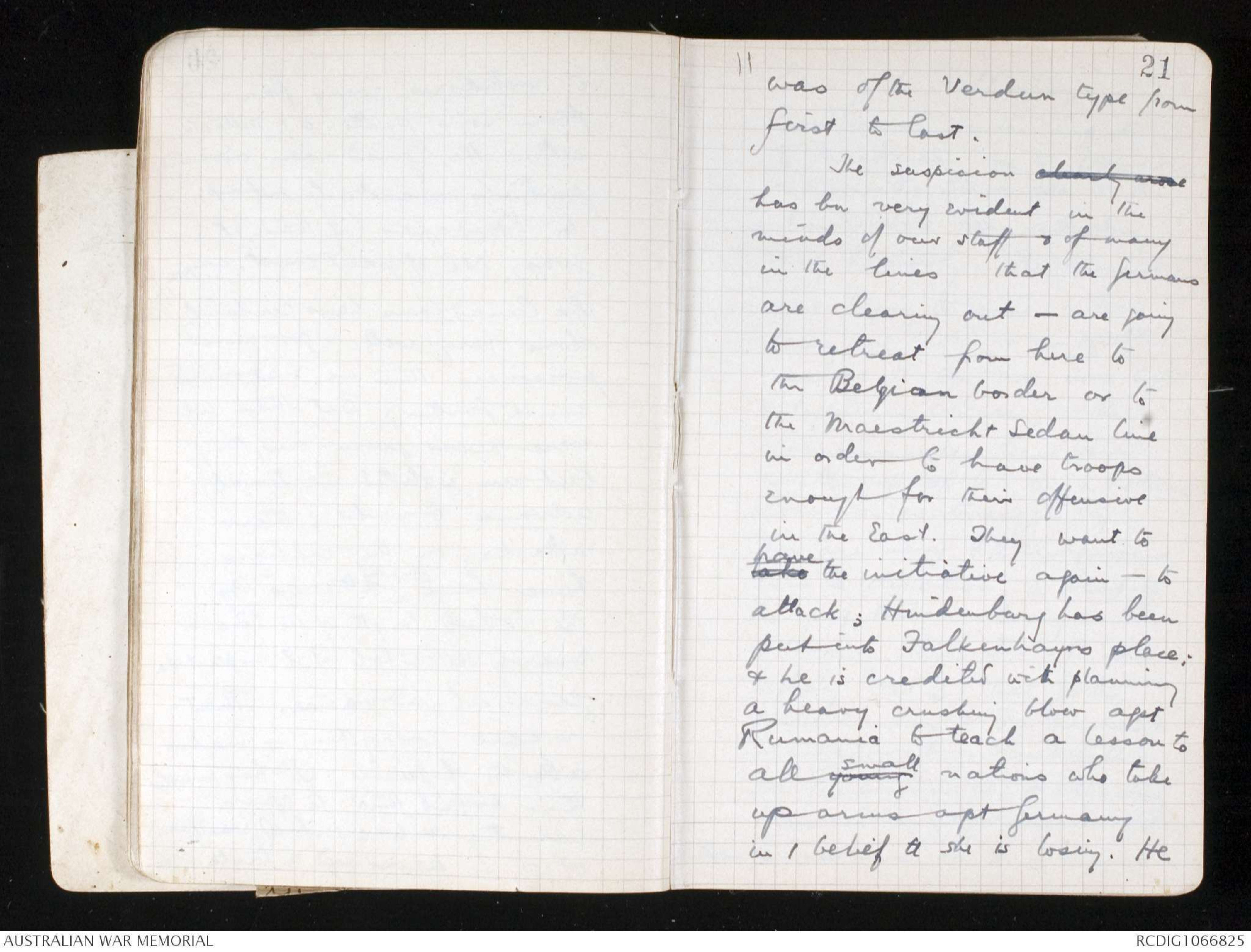
11 9
to face that certain ending.
It may not be believed later,
but every man on this front at
present knows that a ^simple bullet
wound thro' the shoulder is
considered a prize wh you cd
not buy for money: a "cushy"
one - a "Blighty" - every
infantryman envies the man
who goes home w a wound
like that.
And that is quite compatible
with men being prepared to go into
it & fight & die; they wdn't
hesitate to vote tt they must go
in a third time if they knew tt
others were doing their share too;
they certainly wd not vote to stand
out if others were going in.
But men are men; & the
results of the wracking wh they
got at Pozieres is tt Birdwoods
10
Angel
The ^2nd Bde signaller, Angel,
who ws shot in the
spine at Poz., but took
on his message to an
officer, afterwds died.
He got no decoratn at all,
I believe.
[* Later.
Wrong. He
is alive.
CEW.B
3.9.26 *]
11 11
popularity has suffered, w
some of them at any rate.
"He's a b — of a man,"
they say, "wants to put us in
again." It was to some extent
the same after the August battle in
Gallipoli.
All the men do not
clearly distinguish what they
are fighting for. The newspapers
are partly at fault. They speak
invariably of the "Sons of the Empire"
"from overseas" "come to the aid
of the Mother Country" & "fighting
for old England" - & the men,
many of them, gather / idea tt it
is England they are fighting for, &
not ^for their idea o / world as
it shd be & fighting against the
German idea tt a treaty is nothing
& only might is right. - It
11 12
will pass - but that is the
spirit of the corps at / moment.
They have a comradeship for
Scottish troops - at Etaples, (at the
base), & at the front it is
noticeable - but very little
for British troops, who have
not the Scottish independence, &
do not mostly fight so well. TheBritis authorities have, very
foolishly, often put us up alongside
of third rate English troops, like
the 61st Divn (at least ^an officer of the 1st
Army ^H.Q. told the War Correspts tt
these were 3rd rate territorials,
so Russell told me); & only now
have they put the New Zealanders
in near the Guards.
I have no knowledge of
what other corps are saying;
probably they are grumbling
at least as much at their fate -
possibly more. But tt is their
13
The Divisions are still short -
the 51st Bn is the shortest. (By thebye a prisoner reported tt abt 60 menof There are 22,500 reinforcements
in England & at Etaples, & about
16,000 men are needed to fill
up - roughly 4000 for each
division. But they wont let them
out of England until they have had a
14 wks training - they are under the
War Council.
11 14
The German is certainly more
sick of fighting than any - he
has more to be sick at. But
the 1st Anzac Corps is the one I
know - & the fact is it is not
having enough rest to be at its
best if it has to go in again shortly.
And, coming back, I
find tt the impression everywhere
is tt it will have to go back
about the 22nd or 23rd of
October. The men have seen
the 4th (British) Divn just
sent south - our 4th Divn
partly took over their line - &
they know tt the 4th (Brit) Divn
ws badly cut up in the Somme
Battle at the start & was
badly cut up. If that Divn
is in they again, they argue,
15 11
THE ARGUS, WEDNESDAY, [*AUGUST 9, 1916.*]
STAND BY ANZACS
————
Magnificent Achievement
————
SUCCESS CROWNS EFFORT
————
Fight with Knives [x] and Revolvers
[* x we use no knives & few revolvers.]
————
LONDON, Aug 8.
The Paris correspondent of the Central
News Agency telegraphs that Australian
and Kent troops have advanced on the
Pozieres plateau, in the direction of Martinpuich.
"The Anzacs," he says, "won fresh glory
in the fighting on Sunday. They firmly held
trenches skirting the Bapaume road against
the attacks of three Saxon and Bavarian
regiments. Both sides lost heavily in knife
and revolver fighting, but the colonials
would not yield, and their magnificent resistance
enabled a British unit to attack the
enemy on the left flank, and drive them off
in a north-westerly direction. The British
counter-attacks west of Pozieres then
hurled the Germans back to their trenches,
and enlarged the gains towards Thiepval.
"The German losses were heaviest at
Pozieres Mill and Hill 160. Here three
enemy battalions, advancing in echelon,
were mown down by the oblique fire of the
British gunners, and the German remnant
scurried back in disorder. This gave the
signal for a fine, dashing attack by the men
of Kent and the Anzacs, who brilliantly
carried two lines of trenches and advanced
200 yards on the plateau in the direction of
Martinpuich."
An army order issued by General Below
found on prisoners said:- "You must at
all costs recapture the Pozieres plateau. If
the British retain it, it will give them a
valuable advantage. It must be retaken
forthwith. Our troops who first gain a
foothold on it must maintain their ground,
whatever the sacrifice, pending the arrival
of reinforcements. Any officer or man who
does not resist to the death will be immediately
tried by court-martial."
______________
AUSTRALIAN SUCCESS.
————
Of Great Importance.
The New York "Evening World" publishes
a despatch from the British front
which speaks in terms of commendation of
the work of the Australians in the charge
on Friday.
"For days, " it says, "they had been holding
grimly the village of Pozieres under a
tornado of German shells. Then they
charged over a two-mile front, sweeping
the Germans several hundred yards back.
"The opinion at headquarters is that
the value of the gain cannot be estimated.
A week fighting with sap and bomb preceded
the attack, [*] which the Australians
made [*] amidst a volcano of bursting shells
and under a blazing sun. They streamed
into the trenches, and were digging forward
with pick and spade."
________________
Anzac Fights Seven Germans.
————
Five Killed; Two Captured.
A sergeant-major who was wounded in
the fighting north of Pozieres on Friday
relates a remarkable piece of fighting by
an Anzac.
"An Australian," he says, "was knocked
down by seven Germans, who disarmed
him. A mate of the Anzac arrived in the
nick of time, and, singlehanded, fought the
seven Germans. He killed five with his
hands, and made the remaining two
prisoners."
_________________
[*11 16
we too shall be in abt a
month later. I daresay
tt something also may have
leaked out. I do not know if
it is fixed or certain at all.
But there it is; & it is not popular.
The truth is soldiers are
not the fictions which war
correspondents have made
of them, but ordinary human
men. And for an ordinary
man, feeling as men
wd feel after Pozieres, to
go into it again, in spite
of their natural state
of mind & to do all the
wd do is a hundred
times finer than the*]
15 11
Newspaper cutting {folded] - see above for full text
11 16
We too shall be in abt a
month later. I daresay
tt something also may have
leaked out - I do not know if
it is fixed or certain at all.
But there it is; & it is not popular.
The truth is soldiers are
not the fictions which war
correspondents have made
of them, but ordinary human
men. And for an ordinary
man, feeling as men
wd feel after Pozieres, to
go into it again in spite
of their natural state
of mind & to do all they
wd do is a hundred
times finer than the
heroics that have been
written in the past. It
is popular to write
the sort of rubbish
on the opposite page
about soldiers.
Not one word of all
this cutting from the
Argus is ^literally true - except
the American.
quotation, curiously
enough. If the sentence
17
Observer.
Sund. October 1st 1916
GERMANS.
——————
DISCRIMINATING PRAISE OF THE
ALLIES.
————
AMSTERDAM, Saturday.
The correspondent of the "Berliner Tageblatt"
on the Western front, after referring
to the abundant stores of munitions of the
Allies, says :-
"It is not only the German soldier who
experiences terrible hours under fire. Germans
hurl on their enemy a sufficient abundance of
destructive shells. The enemy will every day
become better acquainted with the relentless
nature of German warfare. The front is
swollen with munitions, the quantity of
German war material is increasing and the new
enterprises of the enemy are confronted by
continually stronger and more threatening means
of resistance."
The writer describes with joy what he has
seen of the German curtain fire. He says :-
"The British soldier is less disciplined than
the French, but he does his duty often in too
sporting a spirit, but often, however, wildly
and fiercely. The Irish join in the fighting
uprightly and desire to have no evil said of
them. The Anzacs are brave, strong and
expert soldiers." - Reuter.
11 18
underlined : "a week of fighting
with sap & bomb preceeded the
attack which the Australians
made under a blazing amidst a volcano of
bursting shell & under a blazing
sun" - is excepted, the American
version is right. If the "which"
referred to the weeks sapping
(wh ws done under amidst volcanoes
of shells & under a blazing
sun, all right) then the
American version is literally
correct - the bombing excepted.
The Australian soldier is
as I have made him in these
pages; & if I have failed to
show the impressive nobility
in him, it is not because it
has not impressed me. It is the
strongest impression I possess
- & if I cannot make others
see it, with all ^the defects, lovable
& unlovable, thrown in - then it
is my powers tt are at fault. The
cutting opposite shows what some
Germans think of him. Another
11 19
German, after ^the Armentieres
raid, speaking of the Australians
"sons of sheep farmers" whom
they captured met there says:
"We do not like these Australians -
we do not like their
faces." I'll be bound they
didn't. Germans wouldn't.
I can imagine the Australian
prisoners whom they took -
300 or 400 of them, wounded
& unwounded; I can imagine
them being told sharply by a
Prussian officer to salute &
click their heels & stand to
attention. I can just see
some of them.
The British, Canadians,
& N.Zealanders have made
great advances since Sept. 15
when they went forwd about
a mile. The Germans seemed
11 20
to withdraw very far
from some parts o / attack
when the Canadians advanced;
patrols arent almost up
to Maurepas (I think it
was, NE of Grandcourt, anyway).
The Canadians have certainly
done very well - got more
prisoners than we & advanced
much further. But then we
were never given anything
but an isolated sectional
advance to make; their
attacks, on the contrary
have been ^during attacks by
the whole length of the line or
nearly the whole of it - part of a
general advance. That
means everything - makes
all the difference. It has enabled
them to get thro' to open
country. & to a sort of warfare
of wh we never had a taste. Ours
11 21
was of the Verdun type from
first to last.
The suspicion already arose
has bn very evident in the
minds of our staff & of many
in the lines that the Germans
are clearing out - are going
to retreat from here to
the Belgian border or to
the Maestricht Sedan line
in order to have troops
enough for their offensive
in the East. They want to
take have the initiative again - to
attack; Hindenburg has been
put into Falkenhayns place;
& he is credited with planning
a heavy crushing blow agst
Rumania to teach a lesson to
all young small nations who take
up arms agst Germany
in / belief tt she is losing. He
 Loretta Corbett
Loretta CorbettThis transcription item is now locked to you for editing. To release the lock either Save your changes or Cancel.
This lock will be automatically released after 60 minutes of inactivity.